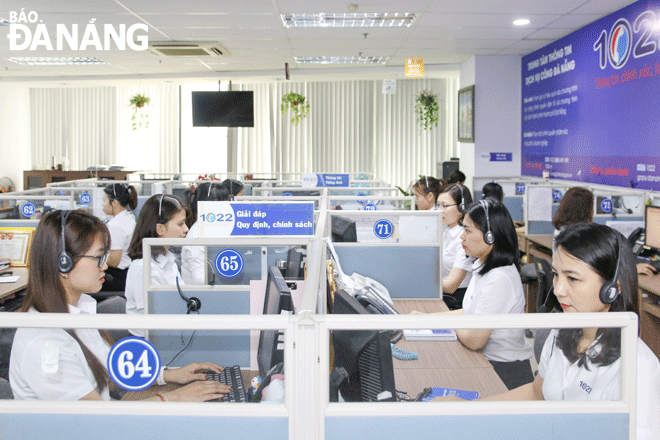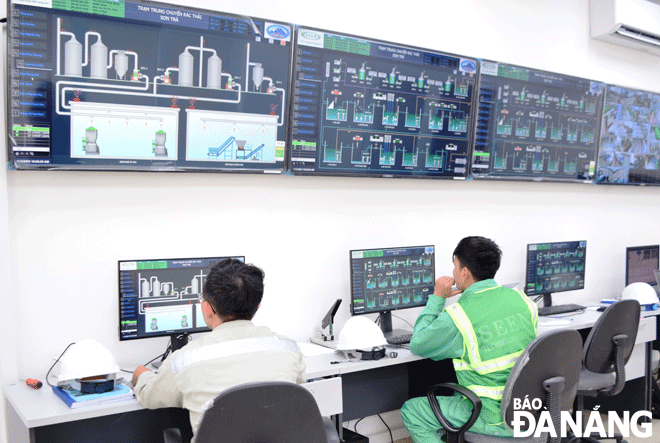Da Nang to build typical digital transformation city model
In 2023, the National Committee for Digital Transformation will monitor and urge Da Nang to develop a typical digital transformation city model. Accordingly, the central coastal city will implement a comprehensive digital transformation on all three pillars of digital government, digital economy and digital society at district, ward and commune levels.
 |
| The city will implement a total and comprehensive digital transformation on all three pillars: digital government, digital economy and digital society. IN THE PHOTO: Staff of the Da Nang Public Service Information Center receive and respond to public service information. Photo: P.V |
Three pillars of digital transformation
Developing a typical digital transformation city model in Da Nang and expanding the model into other localities nationwide are among the key tasks set by the National Committee for Digital Transformation in 2023.
According to the Da Nang Department of Information and Communications, the city is now ready to implement the abovementioned tasks at the request of the National Committee for Digital Transformation.
However, there is now no specific model and criteria for a typical digital transformation city model, so the city will comprehensively implement digital transformation on all three pillars of digital government, digital economy and digital society.
On the basis of implementation results, the city will synthesise reports and review the implementation in December 2023 in order to define a typical model to share its results, practice and experience to other cities and provinces nationwide.
Director of the municipal Department of Information and Communications Nguyen Quang Thanh said that a digital transformation model has been identified in the city’s digital transformation project to 2025, with orientation to 2030.
Under the project, Da Nang's digital transformation model is called ‘Smart city, digital transformation’ with 3 pillars: of digital economy, digital government and digital society. These 3 pillars are based on a platform with 4 layers from the top, including digital platform, digital data, digital infrastructure, and institutions and policies.
The digital economy has made a significant contribution to the city's GRDP structure with the rate of 12.57% in 2021 and about 17% in 2022, becoming an economic sector with high growth rates.
The city currently has more than 2.3 digital technology enterprises per 1,000 inhabitants, ranking second after Ho Chi Minh City, three times higher than the national average.
As of late 2022, about 47,500 people are working in the city’s information technology sector, accounting for 7.7% of the city's total labor force, higher than the national rate of 2.1%.
With regard to digital government, 100% of the eligible administrative procedures are offered online at level 4, of which 91% services generate online records, 1.7 times higher than the national average.
The rate of application processing online in Da Nang reached 73%, 1.3 times higher than the national average.
The city has put into use the data warehouse of results of handling digital administrative procedures to serve the provision of digital services. In addition, the IOC Intelligent Monitoring Center with 6 basic intelligent services and 12 other additional services has been built. The Smart City Operational Monitoring Center has been put into operation.
As for the digital society, Da Nang has the highest percentage of people using mobile phones in the country with a rate of 276 devices/100 people and 105 smart phones/100 people. Each citizen has nearly 2 social network accounts on an average.
There are now more than 2,320,000 active trading accounts at banks or other authorised organisations of people aged 15 years and over.
The most highlight of the digital society in 2022 was to put into use the city's digital citizenship platform. Thanks to this, each citizen has a digital data store (through a digital citizen account) so that he/she is able to inherit information and data as well as easily access and use all convenient services of the government and businesses.
 |
| The city has formed an IOC Intelligent Monitoring Center with 6 basic intelligent services and 12 other additional services, most of which are in the field of environment. IN THE PHOTO: Smart monitoring and control system at the Son Tra District Garbage Transfer Station. Photo: H.H |
Unlocking data sources to create new value
According to the Department of Information and Communications, in 2023, the city will deploy the theme of digital transformation "Unlocking data sources to create new value" with 33 criteria on 3 pillars digital government, digital economy and digital society, including 13 specific criteria for Da Nang.
Accordingly, in terms of digital government (14 criteria), the city sets targets that the rate of public administrative services with online records will reach 95%, and that of online public administrative records 80%. Meanwhile, the percentage of administrative procedures to be reduced through digital data inheritance will be 5%, the digitization rate of administrative procedure settlement results will be 100% of new results. Also, 5 results of handled digital administrative procedures will be reused.
As for the digital economy (9 criteria), the city strives to achieve a digital economy ratio of 20% of the city's total GRDP, with 60% of small and medium-sized enterprises using digital platforms, 80% of businesses using electronic contracts, and 10 sets of digital or open data that create value or new products.
In terms of digital society, the 5G service coverage rate will be 20%, and the rate of households having digital addresses will be 70%.
The percentage of people with unique medical ID codes and personal electronic health records will be approximately 100%.
All of the local students will hold ID codes and electronic school records and 100% of the schools will implement cashless online tuition payment. The percentage of digital workers in the workforce will reach 4.5%.
Mr. Nguyen Quang Thanh said that, based on the results of the implementation of the Digital Transformation project, especially in 2023, the city will coordinate with the National Committee for Digital Transformation to summarise and evaluate its digital transformation model.
Reporting by NAM TRAN - Translating by M.DUNG








